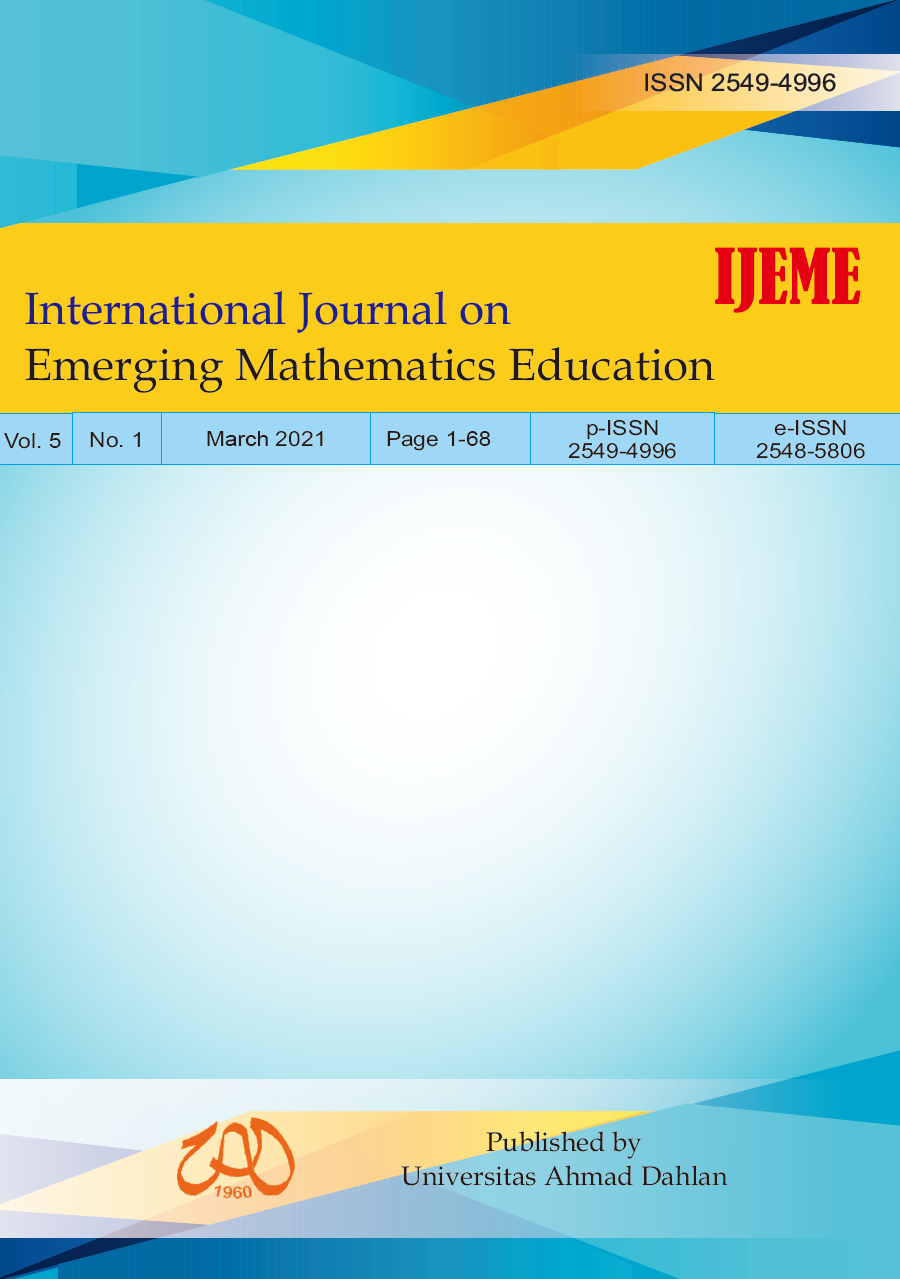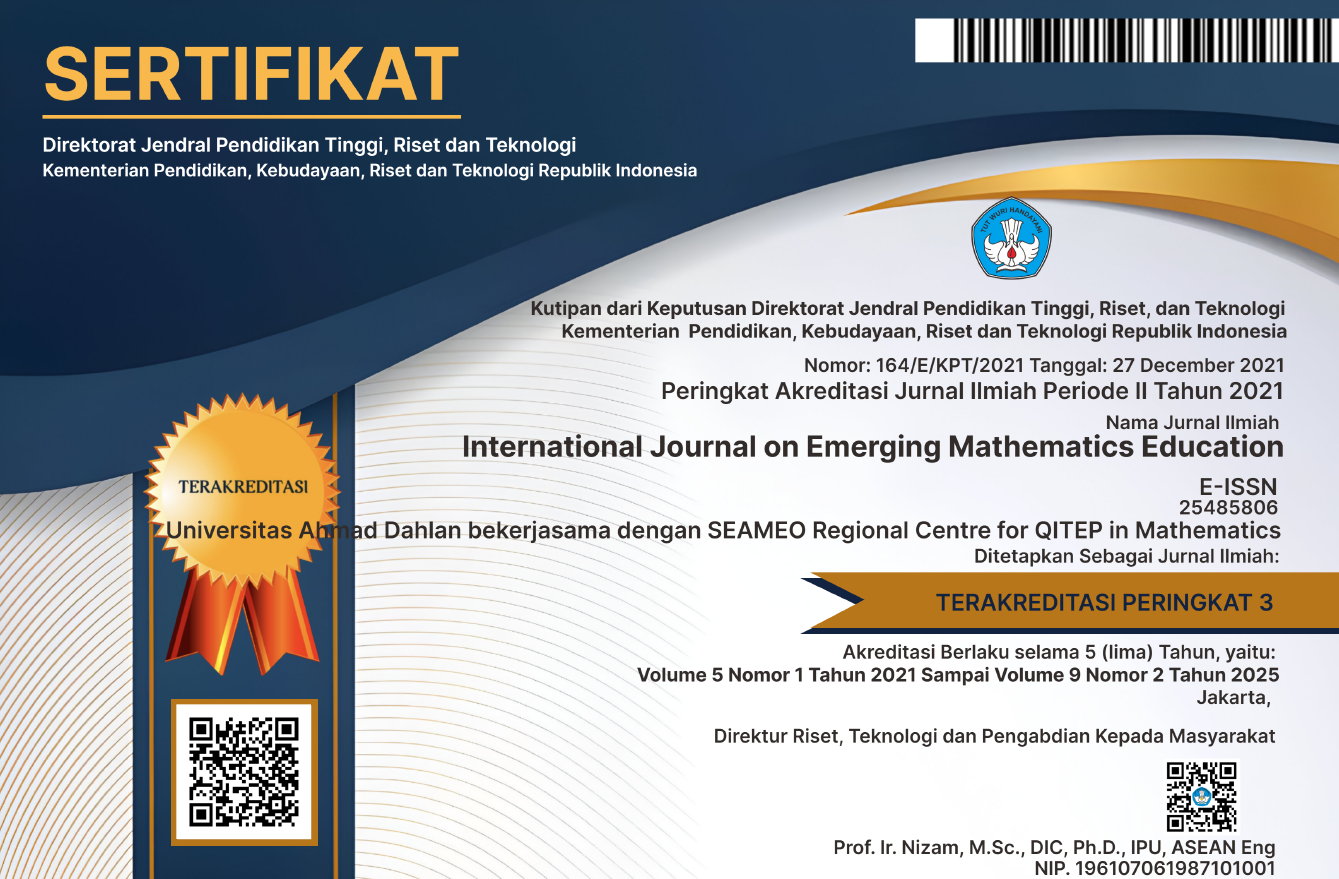Ethnomathematics Perspective and Challenge as a Tool of Mathematical Contextual Learning for Indigenous People
DOI:
https://doi.org/10.12928/ijeme.v5i1.17072Keywords:
contextual learning, ethnomathematics, indigenous peopleAbstract
Indigenous people have a very strong connection with culture. The national curriculum needs to provide a place for student learning in indigenous people. Mathematics as knowledge applied in daily life activities becomes relevant to the culture of indigenous people. The purpose of this study is to obtain an overview related to the perspective and challenge of ethnomathematics as a contextual learning mathematics framework for indigenous people. This research is a qualitative study with an ethnographic approach and is carried out on Ammatoa indigenous people, Tana Toa Village, Kajang District, Bulukumba Regency, South Sulawesi Province. The data sources in this study were the head of the Tana Toa village, the tribal chief of Ammatoa, and the teacher in the indigenous territories. Data collection is done through observation, in-depth interviews, literature studies, and document analysis. The results of this study indicate the association of Ammatoa culture with mathematical content which includes knowledge systems, traditional activities, and cultural artifacts. Domains of school mathematics content related to Ammatoa culture include; the concept of number, geometry, comparison, sequence and series, as well as probability and combinatorics. Mathematics learning in Ammatoa indigenous people needs to consider aspects of culture that involve collaborative involvement.
References
Ary, D., Jacobs, L. C., & Sorensen, C. (2010). Introduction to Research in Education. Belmont: Cengage Learning.
Ascher, M. (1995). Models and Maps from the Marshall Islands: A Case in Ethnomathematics. Historia Mathematica, 22, 347-370.
Ascher, M. (1997). Malagasy Sikidy: A Case in Ethnomathematics. Historia Mathematica, 24, 376-395.
Baxter, L. P., & Meyers, N. M. (2019). Indigenous (and all) students' school attendance: Investigating data collection methods. Issues in Educational Research, 29(4), 1068-1088.
Darmayasa, J. B. (2018). Studi Etnografi Tentang Literasi Matematik dan Ethnomathematics Masyarakat Bali Mula. Bandung: Universitas Pendidikan Indonesia.
Entremont, Y. (2015). Linking mathematics, culture, and community. Procedia Social and Behavioral Sciences, 174, 2818-2824.
Fouze, A. Q., & Amit, M. (2018a). On the Importance of an Ethnomathematical Curriculum in Mathematics Education. EURASIA Journal of Mathematics, Science and Technology Education, 14(2), 561-567.
Fouze, A. Q., & Amit, M. (2018b). Development of Mathematical Thinking through Integration of Ethnomathematic Folklore Game in Math Instruction. EURASIA Journal of Mathematics, Science and Technology Education, 14(2), 617-630.
Gavarrete, M. E. (2015). The challenges of mathematics education for Indigenous teacher training training. Intercultural Education Journal, 26(4), 326-337.
Hunter, J., Hunter, R., Bills, T., Cheung, I., & Hannant, B. (2016). Developing Equity for Pasifika Learners Within a New Zealand Context: Attending to Culture and Values. New Zealand Journal of Educational Studies, 51(2), 197-209.
Ismail, M. R., & Ismail, H. (2010). Exploring Malay-Islamic Ethnomathematics: Al-Khatib's Combinatoric Theory In Alam Al-Hussab And Raudah Al-Hussab. International Conference on Mathematics Education Research, 8, 735-744.
Johnson, J. (2017). A Topic Revisited: Students in the Republic of the Maldives Writing Contextual Word Problems. International Electronic Journal of Mathematics Education, 12(3), 549-559.
Khoroshikh, P. P., & Sergievich, A. A. (2019). Fundamentals of Mathematical Knowledge in the Traditional Culture of Evenks. Journal of Language and Cultural Education, 7(1), 70-83.
Laurens, T., Ngilawayan, D., & Pattiasina, J. (2019). Ethnomathematics Study of Islands Indigenous people in Maluku Province, Indonesia. Jurnal Pendidikan Progresif, 9(1), 113-122.
MOEC. (2017). UU Nomor 5 Tahun 2017 Tentang Pemajuan Kebudayaan. Jakarta: Indonesian Ministry of Education and Culture.
MOEC. (2018). Permendibud Nomor 20 Tahun 2018 Tentang Penguatan Pendidikan Karakter pada Satuan Pendidikan Formal. Jakarta: Indonesian Ministry of Education and Culture.
Moramay, M., & Mandez, M. (2010). The vigesimal numerical system in the communities practices of the maya's culture. Procedia Social and Behavioral Sciences, 2, 3468-3471.
Nisser, D. V. A. (2017). Can collaborative consultation , based on communicative theory , promote an inclusive school culture? Issues in Educational Research, 27(4), 874-891.
Nkopodi, N., & Mosimege, M. (2009). Incorporating the indigenous game of morabaraba in the learning of mathematics. South African Journal of Education, 29, 377-392.
Nur, A. S., Waluya, S. B., Rochmad, R., & Wardono, W. (2020). Contextual learning with Ethnomathematics in enhancing the problem solving based on thinking levels. JRAMathEdu (Journal of Research and Advances in Mathematics Education), 5(3), 331-344.
Nutti, Y. J. (2016). Decolonizing Indigenous teaching: Renewing actions through a Critical Utopian Action Research framework. Action Research Journal, 10(1), 1-23.
Orey, D. C., & Rosa, M. (2006). Ethnomathematics: Cultural Assertions and Challenges Towards Pedagogical Action. The Journal of Mathematics and Culture, 6(1), 57-78.
Owens, K. (2012). Identity and Ethnomathematics Projects in Papua New Guinea An Ecocultural Pedagogy of Mathematics. Proceedings of the 35th annual conference of the Mathematics Education Research Group of Australasia (pp. 586-593).
Rosa, M., & Orey, D. C. (2018). The Anthropological Dimension on Ethnomodelling Research Based on Ethnomathematics and Modelling. Journal of Archaeology and Anthropology, 1(1), 1-8.
Sambu, A. H. (2016). Sejarah Kajang. Yogyakarta: Lingkar Media.
Verner, I., Massarwe, K., & Bshouty, D. (2019). Development of competencies for teaching geometry through an ethnomathematical approach. Journal of Mathematical Behavior, 100708.
Waziri, M. Y., Saidu, I., & Musa, H. (2010). A mathematical approach on solving Hausa Puzzles in Northern Nigeria. Procedia-Social and Behavioral Sciences, 8, 694-699.
Weldeana, H. N. (2016). Ethnomathematics in Ethiopia: Futile or Fertile for Mathematics Education? Momona Ethiopian Journal of Science (MEJS), 8(2), 146-167.
Were, G. (2003). An Anthropological Approach to Mathematics Education. Journal of Material Culture, 8(1), 25-44.
Yee, S. P., & Bostic, J. D. (2014). The Journal of Mathematical Behavior Developing a contextualization of students' mathematical problem solving. Journal of Mathematical Behavior, 36, 1-19.
Downloads
Published
How to Cite
Issue
Section
License
License and Copyright Agreement
In submitting the manuscript to the journal, the authors certify that:
- They are authorized by their co-authors to enter into these arrangements.
- The work described has not been formally published before, except in the form of an abstract or as part of a published lecture, review, thesis, or overlay journal. Please also carefully read the International Journal on Emerging Mathematics Education (IJEME) Author Guidelines at http://journal.uad.ac.id/index.php/IJEME/about/submissions#authorGuidelines
- That it is not under consideration for publication elsewhere,
- That its publication has been approved by all the author(s) and by the responsible authorities, tacitly or explicitly, of the institutes where the work has been carried out.
- They secure the right to reproduce any material that has already been published or copyrighted elsewhere.
- They agree to the following license and copyright agreement.
Copyright
Authors who publish with the International Journal on Emerging Mathematics Education (IJEME) agree to the following terms:
- Authors retain copyright and grant the journal the right of first publication with the work simultaneously licensed under a Creative Commons Attribution License (CC BY-SA 4.0) that allows others to share the work with an acknowledgment of the work's authorship and initial publication in this journal.
- Authors are able to enter into separate, additional contractual arrangements for the non-exclusive distribution of the journal's published version of the work (e.g., post it to an institutional repository or publish it in a book), with an acknowledgment of its initial publication in this journal.
- Authors are permitted and encouraged to post their work online (e.g., in institutional repositories or on their website) prior to and during the submission process, as it can lead to productive exchanges, as well as earlier and greater citation of published work.
![]()
Ciptaan disebarluaskan di bawah Lisensi Creative Commons Atribusi-BerbagiSerupa 4.0 Internasional.





